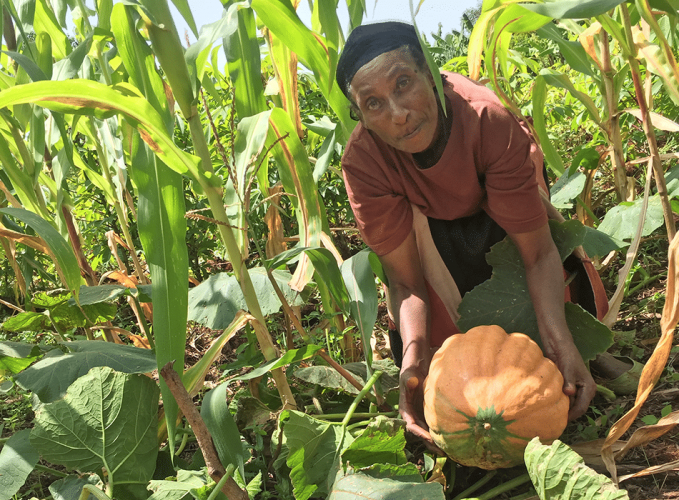Matefie Meja is a single mother of three who farms a half-hectare of land in Chifisa, Ethiopia.
It’s intensive work. As she has no ox to plow the land, weeding is a time consuming chore for her, one that leaves her little time to complete the other work she must do to keep her farm running smoothly.
Recently, thanks to a radio program that explained conservation agriculture to her — a farming approach that emphasizes protecting the soil and the environment in general for increased productivity — Matefie realized there was a different way of farming that puts less strain on her.
There are three main principles to conservation agriculture: minimal soil disturbance, permanent soil cover, and crop rotation or intercropping. Combining these three principles, and including other good agronomic practices can replenish depleted soils and increase production.
For Matefie, conservation agriculture means no plowing.
Matefie learned to intercrop pumpkins and maize, and spread crop residues on her field to keep moisture from evaporating. The process gave Matefie more time for her other chores, while she watched her crops grow tall and productive.
The radio program that Matefie learned from was part of a collaborative project launched by the Canadian Foodgrains Bank in Ethiopia on conservation agriculture, working with Farm Radio International and the Terepeza Development Association. The project is undertaken with matching support from Global Affairs Canada.
Farm Radio International is working with three radio stations in the southern region of Ethiopia to encourage farmers to practice conservation agriculture. The radio programs air interviews with specialists and farmers about conservation agriculture practices, giving farmers the information they need to test the practices in their own fields.
Matefie listened to the radio programs with a group of women in her community.
“Because of the listening group, the single women farmers in our village felt, for the first time, equal to men farmers,” she says.
“We were involved in the discussion about improving our farms and we felt listened to. This group brought a unity to our village and even love. There is a friendly rivalry among the farmers now — each trying to produce the best results!”
This story was originally published on the Farm Radio International blog, at : https://farmradio.org/growing-community-conservation-agriculture-over-the-airwaves/

